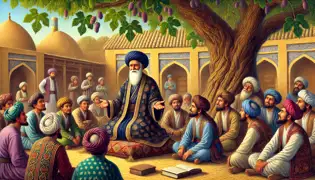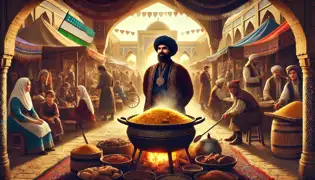In a bustling village cradled between the golden steppes and rugged hills of Uzbekistan, life pulsed with a rhythm as ancient as the land itself. The sun-drenched streets hummed with activity as vendors hawked their goods, children darted between stalls, and the tantalizing aroma of freshly cooked pilaf curled through the air like an invitation.
At the heart of this vibrant scene was Bahrom, a man whose culinary prowess had earned him the title of “Master of Pilaf.” His stall, tucked in the corner of the market square, was a beacon for hungry villagers and weary travelers alike. Bahrom’s pilaf was more than food—it was a symbol of the village’s soul, a dish that brought people together.
But on one fateful day, this cherished harmony was tested by an incident so curious and unexpected that it would become the stuff of legend. The morning began like any other, with Bahrom meticulously preparing his pilaf. He diced carrots, browned chunks of tender lamb, and stirred golden-hued rice into a simmering cauldron of broth. By midday, the dish was ready, and the tantalizing scent spread far and wide, drawing people to his stall like moths to a flame. Kamol, a wiry young man with a mischievous streak, strolled into the square, his stomach growling. His pockets, however, were empty—a predicament that was not uncommon for him. As he wandered near Bahrom’s stall, he closed his eyes and inhaled deeply, savoring the rich aroma. Bahrom noticed Kamol lingering and called out, “Kamol, if you’re hungry, buy a bowl! Standing there won’t fill your belly.” Kamol grinned. “I can’t afford your pilaf, Bahrom, but a whiff of its aroma is free, isn’t it?” At first, Bahrom chuckled, but as Kamol stayed longer, pretending to enjoy an imaginary meal, the humor wore thin. “You’re benefiting from my hard work without paying a single coin!” Bahrom snapped. “Bahrom, you can’t charge for a smell!” Kamol shot back, laughing nervously. But Bahrom was not amused. He banged his ladle on the side of the pot, shouting, “Thief! This man is stealing the essence of my pilaf!” A crowd quickly gathered, their murmurs blending into a hum of intrigue. Kamol, now flustered, tried to explain, but Bahrom was insistent. The villagers, divided in their opinions, decided to take the matter to the wisest person in the village: Qadi Yusuf. Qadi Yusuf was a man whose wisdom and fairness had earned him the trust of not just the villagers but also travelers who passed through the region. He lived in a modest home, surrounded by books and shaded by a gnarled mulberry tree. When the villagers arrived, bringing with them the clamor of disagreement, Qadi Yusuf greeted them with his usual calm demeanor. He sat on a low cushion in his courtyard and gestured for everyone to explain the matter. Bahrom recounted his grievance with fiery indignation, emphasizing the effort he put into crafting his pilaf. “Kamol robbed me of its aroma! He stood there enjoying it without paying a single tanga!” Kamol, flustered but determined to defend himself, retorted, “I didn’t touch the pilaf, Qadi. I only smelled it. How can that be theft?” Qadi Yusuf listened attentively, stroking his beard in thought. “This is indeed an unusual case,” he said, his tone measured. “If Bahrom claims theft and Kamol denies it, we must examine the matter carefully. Come to the village square tomorrow, and I shall deliver my judgment.” The next day, the square was packed with villagers, eager to witness how the Qadi would handle such a peculiar dispute. Qadi Yusuf arrived, carrying a brass pot and a small leather pouch filled with coins. He beckoned Kamol and Bahrom to the center. “Bahrom,” the Qadi said, “bring me a fresh bowl of your pilaf.” Bahrom complied, though he looked suspicious. Qadi Yusuf placed the bowl on a low table, its steam rising in fragrant spirals. Turning to Kamol, he handed him the pouch of coins. “Now, Kamol,” Qadi Yusuf instructed, “stand next to the pilaf and shake this pouch of coins.” Kamol hesitated, confused, but the Qadi’s steady gaze urged him to comply. As Kamol shook the pouch, the jingling of coins filled the square, mingling with the aroma of the pilaf. The villagers watched in rapt silence, trying to discern the Qadi’s intent. After a few moments, Qadi Yusuf raised his hand. “Enough,” he said. “Now, Bahrom, you claimed Kamol benefited from the aroma of your pilaf without paying. In fairness, you shall be compensated with the sound of his coins.” For a moment, there was stunned silence. Then laughter erupted, rippling through the crowd as the villagers marveled at the Qadi’s ingenuity. Even Bahrom, though initially indignant, couldn’t help but laugh at the absurdity of the situation. The incident became the talk of the village, and Bahrom soon realized the lesson hidden within the Qadi’s judgment. His pilaf was not just about the ingredients or the effort he put in—it was about the joy it brought to others. Kamol, humbled by the experience, approached Bahrom a few days later. “Bahrom,” he said, “I’m sorry for causing trouble. I didn’t mean to offend you.” Bahrom smiled, his earlier anger forgotten. “Kamol, you may not have stolen my pilaf, but you certainly stirred things up!” From that day on, the two became friends. Kamol began helping Bahrom at his stall, learning the art of pilaf-making. In time, he discovered that the aroma of pilaf was even sweeter when shared. The story of the pilaf thief and the wise judge spread far beyond the village, finding its way into songs, stories, and even the occasional toast at feasts. Travelers who heard the tale often visited the village, eager to sample Bahrom’s legendary pilaf and stand in the square where justice had been served with such cleverness. As for Qadi Yusuf, he continued to preside over disputes with his characteristic blend of fairness and wit. His name became synonymous with wisdom, and villagers often quoted him: “True justice nourishes the soul, just as good pilaf nourishes the body.” Years later, as children played in the market square, their laughter carried the echoes of a story that reminded everyone of an enduring truth: fairness, creativity, and a touch of humor could turn even the most contentious disputes into cherished memories. This expanded version of “The Pilaf Thief and the Wise Judge” weaves together rich details and deeper interactions to create a more engaging and humanized narrative. The locations of the images remain as indicated, allowing the story to be vividly illustrated.The Accusation
The Journey to Justice

The Unorthodox Trial

A New Friendship

The Tale Lives On


















